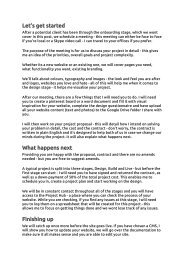BP 2007 Products
Create successful ePaper yourself
Turn your PDF publications into a flip-book with our unique Google optimized e-Paper software.
ut not limited to the time required or costs incurred by the<br />
Vessel in taking any action or any special or additional security<br />
measures required by the ISPS code or MTSA.<br />
v) Save where the Vessel has failed to comply with the requirements of<br />
the International Code for the Security of Ships and of Port Facilities<br />
and the relevant amendments to Chapter XI of SOLAS (ISPS Code)<br />
and within the USA and US territories or waters, with the US Maritime<br />
Transportation Security Act 2002 (MTSA), the Buyer shall be<br />
responsible for any demurrage actually incurred by the Seller arising<br />
from delay to the Vessel at the Discharge Port resulting directly from<br />
the Vessel being required by the port facility or any relevant authority<br />
to take any action or any special or additional security measures or<br />
undergo additional inspections.<br />
vi) If the Discharging Terminal is not operated by the Buyer or an<br />
Associated Company of the Buyer, the Buyer’s liability to the Seller<br />
under this agreement for any costs, losses or expenses incurred by<br />
the Vessel, the charterers or the Vessel owners resulting from the<br />
failure of the Discharge Port/terminal/installation to comply with the<br />
ISPS Code or MTSA shall be limited to the payment of demurrage,<br />
costs, losses or expenses that the Buyer is able to recover and does<br />
recover from its supplier or other relevant third party, and then only to<br />
the extent of such recovery. The Buyer shall, however, use reasonable<br />
efforts so to recover from its supplier or other relevant third party.<br />
1.3 CLC<br />
The Vessel shall:<br />
(a) carry on board certificate(s) as required pursuant to the 1992 Civil<br />
Liability Convention for Oil Pollution Damage or any Protocols<br />
thereto (“CLC”); and<br />
(b) if the Product constitutes Persistent Oil, have in place insurance<br />
cover for oil pollution no less in scope and amounts than available<br />
under the rules of P. & I. Clubs entered into the International<br />
Group of P. & I. Clubs (currently standard oil pollution cover of<br />
US$ 1,000 million<br />
1.4 ISM Certificates<br />
The Vessel shall have on board at all times a valid ISM certificate and the owners,<br />
before and during the voyage, comply with the requirements of the ISM Code.<br />
(For the purposes of the Agreement, “ISM” means the International<br />
Management Code for the Safe Operations of Ships and for Pollution<br />
Prevention.)<br />
1.5 ISGOTT, etc.<br />
The Vessel shall be manned, operated and maintained so as to fully comply with<br />
(i) the standards set out in ISGOTT, (ii) appropriate IMO recommendations, and<br />
(iii) the OCIMF Guidelines for the Control of Drugs and Alcohol On-board Ship<br />
(1990), each as amended from time to time. (For the purposes hereof, “ISGOTT”<br />
means the International Safety Guide for Oil Tankers and Terminals, as current<br />
from time to time, and “IMO” means the International Maritime Organisation.)<br />
1.6 Closed loading and/or discharge<br />
Vessels which are loading/discharging a volatile, toxic or noxious cargo must<br />
operate at all times in the Closed Operations mode. Closed Operations refers to<br />
the procedures whereby Vessels conduct cargo transfer and ballasting<br />
page 68



